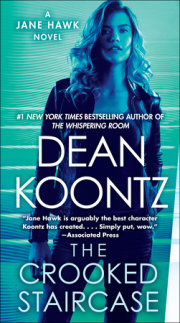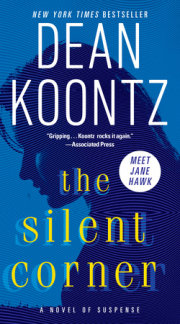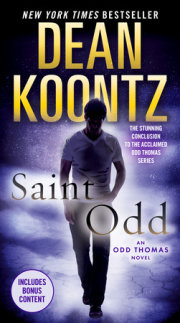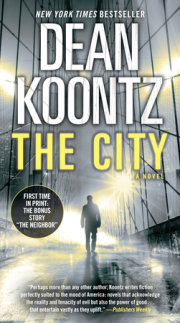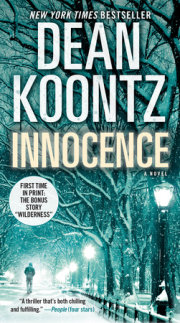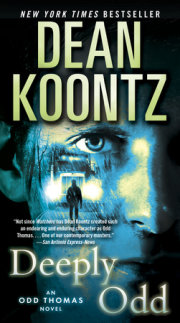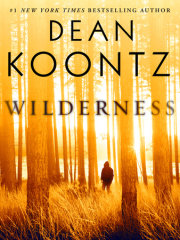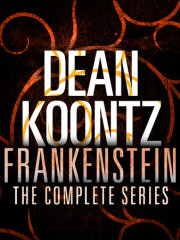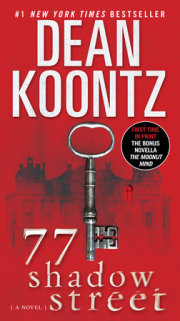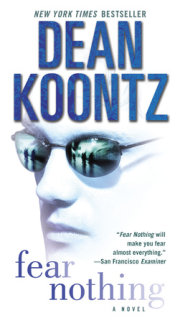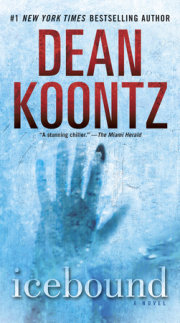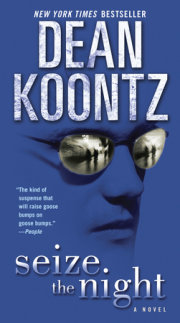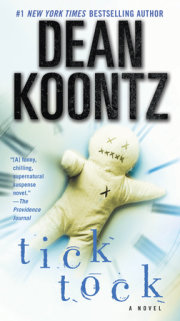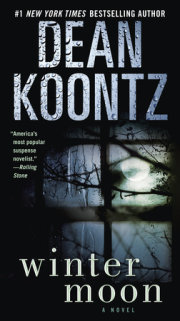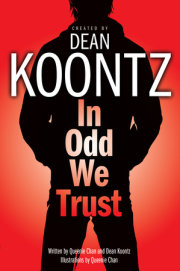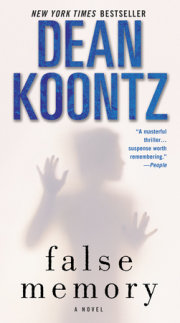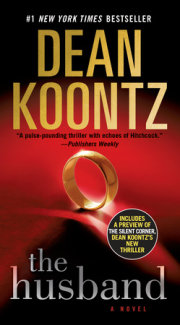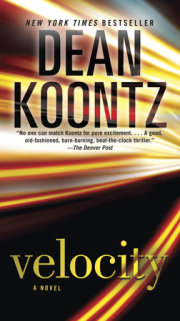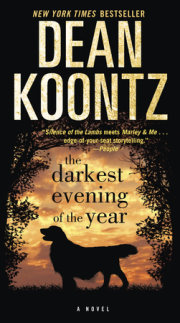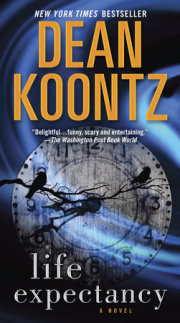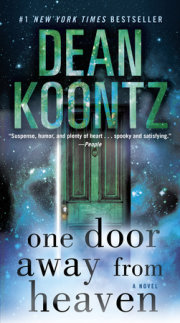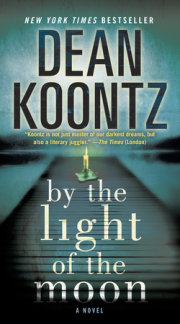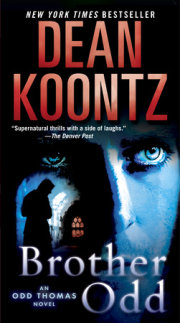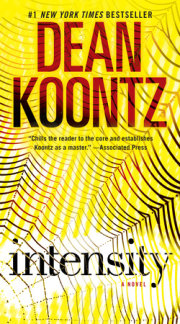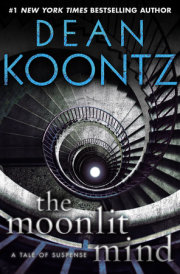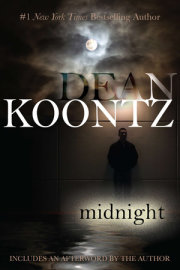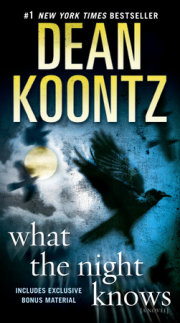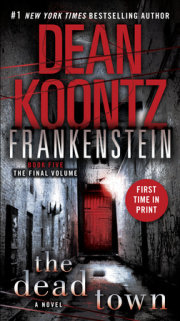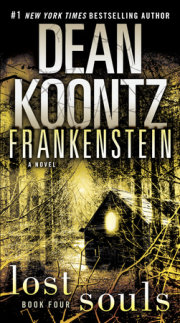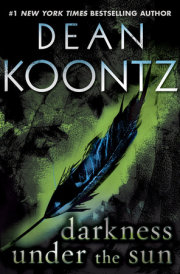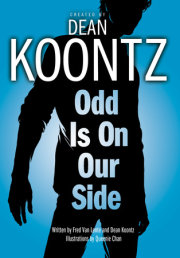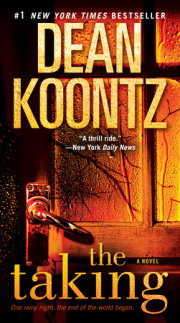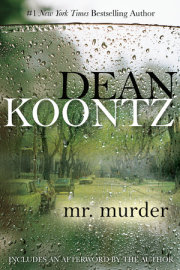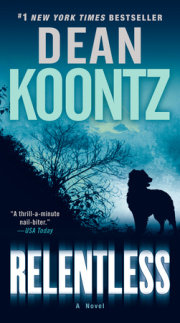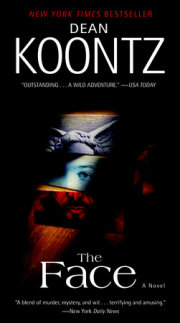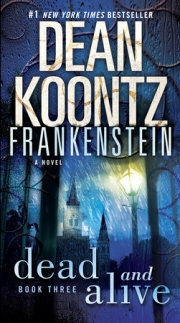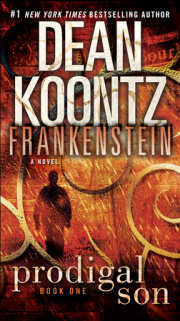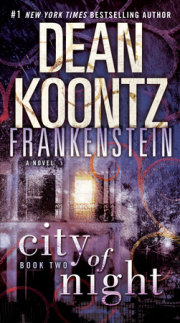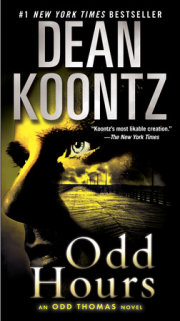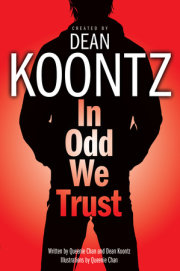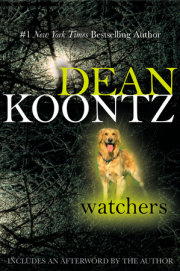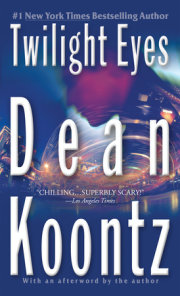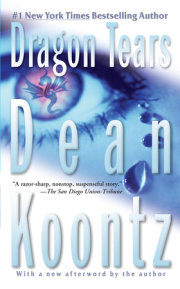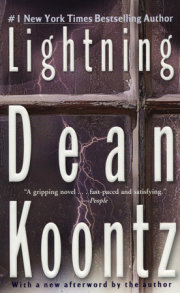Chapter 1
Bartholomew Lampion was blinded at the age of three, when surgeons reluctantly removed his eyes to save him from a fast-spreading cancer; but although eyeless, Barty regained his sight when he was thirteen.
This sudden ascent from a decade of darkness into the glory of light was not brought about by the hands of a holy healer. No celestial trumpets announced the restoration of his vision, just as none had announced his birth.
A roller coaster had something to do with his recovery, as did a seagull. And you can’t discount the importance of Barty’s profound desire to make his mother proud of him before her second death.
The first time she died was the day Barty was born.
January 6, 1965.
In Bright Beach, California, most residents spoke of Barty’s mother, Agnes Lampion — also known as the Pie Lady — with affection. She lived for others, her heart tuned to their anguish and their needs. In this materialistic world, her selflessness was cause for suspicion among those whose blood was as rich with cynicism as with iron. Even such hard souls, however, admitted that the Pie Lady had countless admirers and no enemies.
The man who tore the Lampion family’s world apart, on the night of Barty’s birth, had not been her enemy. He was a stranger, but the chain of his destiny shared a link with theirs.
Chapter 2January 6, 1965, shortly after eight o’clock in the morning, Agnes had entered first-stage labor while baking six blueberry pies. This wasn’t false labor again, because the pains extended around her entire back and across her abdomen, rather than being limited to the lower abdomen and groin. The spasms were worse when she walked than when she stood still or sat down: another sign of the real thing.
Her discomfort wasn’t severe. The contractions were regular but widely separated. She refused to be admitted to the hospital until she completed the day’s scheduled tasks.
For a woman in her first pregnancy, this stage of labor lasts twelve hours on average. Agnes believed herself to be average in every regard, as comfortably ordinary as the gray jogging suit with drawstring waist that she wore to accommodate her baby-stretched physique; therefore, she was confident that she wouldn’t proceed to second-stage labor much sooner than ten o’clock in the evening.
Joe, her husband, wanted to rush her to the hospital long before noon. After packing his wife’s suitcase and stowing it in the car, he canceled his appointments and loitered in her vicinity, although he was careful to stay always one room away from her, lest she become annoyed by his smothering concern and chase him out of the house.
Each time that he heard Agnes groan softly or inhale with a hiss of pain, he tried to time her contractions. He spent so much of the day studying his wristwatch that when he lanced at his face in the foyer mirror, he expected to see the faint reflection of a sweeping second hand clocking around and around in his eyes.
Joe was a worrier, although he didn’t look like one. Tall, strong, he could have subbed for Samson, pulling down pillars and collapsing roofs upon the Philistines. He was gentle by nature, however, and lacked the arrogance and the reckless confidence of many men his size. Although happy, even jolly, he believed that he had been too richly blessed with fortune, friends, and family. Surely one day fate would make adjustments to his brimming accounts.
He wasn’t wealthy, merely comfortable, but he never worried about losing his money, because he could always earn more through hard work and diligence. Instead, on restless nights, he was kept sleepless by the quiet dread of losing those he loved. Life was like the ice on an early-winter pond: more fragile than it appeared to be, riddled by hidden fractures, with a cold darkness below.
Besides, to Joe Lampion, Agnes was not in any way average, regardless of what she might think. She was glorious, unique. He didn’t put her on a pedestal, because a mere pedestal didn’t raise her as high as she deserved to be raised.
If ever he lost her, he would be lost, too.
Throughout the morning, Joe Lampion brooded about every known medical complication associated with childbirth. He had learned more than he needed to know on this subject, months earlier, from a thick medical-reference work that had raised the hair on the back of his neck more effectively and more often than any thriller he had ever read.
At 12:50, unable to purge his mind of textbook descriptions of antepartum hemorrhage, postpartum hemorrhage, and violent eclamptic convulsions, he burst through the swinging door, into the kitchen, and announced, “All right, Aggie, enough. We’ve waited long enough.”
At the breakfast table, she was writing notes in the gift cards that would accompany the six blueberry pies that she had baked that morning. “I feel fine, Joey.”
Other than Aggie, no one called him Joey. He was six feet three, 230 pounds, with a stone-quarry face that was all slabs and crags, fearsome until he spoke in his low musical voice or until you noticed the kindness in his eyes.
“We’re going to the hospital now,” he insisted, looming over her at the table.
“No, dear, not yet.”
Even though Aggie was just five feet three and, minus the pounds of her unborn child, less than half Joey’s weight, she could not have been lifted out of the chair, against her will, even if he’d brought with him a power winch and the will to use it. In any confrontation with Aggie, Joey was always Samson shorn, never Samson pre-haircut.
With a glower that would have convinced a rattlesnake to uncoil and lie as supine as an earthworm, Joey said, “Please?”
“I have pie notes to write, so Edom can make deliveries for me in the morning.”
“There’s only one delivery I’m worried about.”
“Well, I’m worried about seven. Six pies and one baby.”
“You and your pies,” he said with frustration.
“You and your worrying,” she countered, favoring him with a smile that affected his heart as sun did butter.
He sighed. “The notes, and then we go.”
“The notes. Then Maria comes for her English lesson. And then we go.”
“You’re in no condition to give an English lesson.”
“Teaching English doesn’t require heavy lifting, dear.”
She did not pause in her note writing when she spoke to him, and he watched the elegantly formed script stream from the tip of her ballpoint pen as though she were but a conduit that carried the words from a higher source.
Finally, Joey leaned across the table, and Aggie looked up at him through the great silent fall of his shadow, her green eyes shining in the shade that he cast. He lowered his raw-granite face to her porcelain features, and as if yearning to be shattered, she raised up slightly to meet his kiss.
“I love you, is all, “he said, and the helplessness in his voice exasperated him.
“Is all?” She kissed him again. “Is everything.”
“So what do I do to keep from going crazy?”
The doorbell rang.
“Answer that,” she suggested.
Chapter 3The primeval forests of the Oregon coast raised a great green cathedral across the hills, and the land was as hushed as any place of worship. High above, glimpsed between the emerald spires, a hawk glided in a widening gyre, dark-feathered angel with a taste for blood.
Here at ground level, no wildlife stirred, and the momentous day was breathless. Luminous veils of fog still lay motionless in the deeper hollows, where the departed night had discarded them. The only sounds were the crunch of crisp evergreen needles underfoot and the rhythmic breathing of experienced hikers.
At nine o’clock that morning, Junior Cain and his bride, Naomi, had parked their Chevy Suburban along an unpaved fire road and headed north on foot, along deer trails and other natural pathways, into this shadowy vastness. Even by noon, the sun penetrated only in narrow shafts that brightened most of the woods by indirection.
When Junior was in the lead, he occasionally drew far enough ahead of Naomi to pause and turn and watch her as she approached him. Her golden hair shimmered always bright, in sunshine or shadow, and her face was that perfection of which adolescent boys dreamed, for which grown men sacrificed honor and surrendered fortune.
Sometimes, Naomi led; following her, Junior was so enraptured by her lithe form that he was aware of little else, oblivious of the green vaults, the columnar trunks, the lush ferns, and the flourishing rhododendrons.
Although Naomi’s beauty might alone have captured his heart, he was equally enchanted by her grace, her agility, her strength, and by the determination with which she conquered the steepest slopes and the most forbiddingly stony terrain. She approached all of life — not just hiking — with enthusiasm, passion, intelligence, courage.
They had been married fourteen months, yet daily his love grew stronger. He was only twenty-three, and sometimes it seemed that one day his heart would be too small to contain his feelings for her.
Other men had pursued Naomi, some better looking than Junior, many smarter, virtually all of them richer. Yet Naomi had wanted only him, not for what he owned or might one day acquire, but because she claimed to see in him “a shining soul.”
Junior was a physical therapist, and a good one, working mostly with accident and stroke victims who were struggling to regain lost physical function. He would never lack for meaningful work, but he would never own a mansion on a hill.
Fortunately, Naomi’s tastes were simple. She preferred beer to champagne, shunned diamonds, and didn’t care if she ever saw Paris.
She loved nature, walks in the rain, the beach, good books. Hiking, she often sang softly when the trail was easy. Two of her favorite tunes were “Somewhere Over the Rainbow” and “What a Wonderful World.” Her voice was as pure as spring water and as warm as sunshine. Junior often encouraged her to sing, for in her song he heard a love of life and an infectious joy that lifted him.
Because this January day was unseasonably warm, in the sixties, and because they were too close to the coast to be in a snow zone at any altitude, they wore shorts and T-shirts. The pleasant heat of exertion, the sweet ache of well-tested muscles, the forest air scented with pine, the tautness and grace of Naomi’s bare legs, her sweet song: This was what paradise might be like if paradise existed.
On a day hike, not intending to camp overnight, they carried light packs — a first-aid kit, drinking water, lunch — and thus made good time.
Shortly after noon, they came to a narrow break in the forest and stepped onto the final coil of the serpentine fire road, which had arrived at this point by a route different from theirs. They followed the dirt track to the summit, where it terminated at a fire tower that was indicated on their map by a red triangle.
The tower stood on a broad ridge line: a formidable structure of creosote-soaked timbers, forty feet on a side at the base. The tower tapered as it rose, though an open view deck flared out from the top. In the center of the deck was an enclosed observation post with large windows.
The soil was stony and alkaline here, so the most impressive trees were only a hundred feet tall, little more than half the size of many of the rain-forest behemoths that thrived on lower slopes. At 150 feet, the tower rose high above them.
The switchback stairs were in the center of the open framework, rising under the tower rather than circling the exterior. Aside from a few sagging treads and loose balusters, the staircase was in good condition, yet Junior became uneasy when he was just two flights off the ground. He wasn’t able to pinpoint the cause of his concern, but instinct told him to be wary.
Because the autumn and winter had been rainy, the fire danger was low, and the tower was not currently manned. In addition to its more serious function, the structure also served as an observation platform open to any of the public determined enough to reach it.
The steps creaked. Their footfalls echoed hollowly through this half-enclosed space, as did their heavy breathing. None of these sounds was a reason for alarm, and yet . ..
As Junior ascended behind Naomi, the wedge-shaped open spaces between the crisscrossed framing beams grew narrower, allowing ever less daylight to penetrate. The space under the tower platform became gloomy, though never dark enough to require a flashlight.
The penetrating odor of creosote was now laced with the musty smell of mold or fungus, neither of which should have been thriving in the presence of timber treated with such pungent wood tar.
Junior paused to peer down the stairs, through the trestlework of shadows, half expecting to discover someone stealthily climbing behind them. As far as he could see, they were not being stalked.
Only spiders kept them company. No one had come this way in weeks, if not months, and repeatedly they encountered daunting webs of grand design. Like the cold and fragile ectoplasm of summoned spirits, the gossamer architecture pressed against their faces, and so much of it clung tenaciously to their clothes that even in the gloom, they began to look like the risen dead in tattered gravecloth.
As the diameter of the tower shrank, the steps came in shorter and steeper flights, finally ending at a landing only eight or nine feet below the floor of the observation platform. From here, a ladder led up to an open trapdoor.
When Junior followed his agile wife to the top of the ladder and then through the trap, onto the observation deck, he would have been knocked breathless by the view if he’d not already been left gasping by the climb. From here, fifteen stories above the highest point of the ridge and five stories above the tallest trees, they saw a green sea of needled waves rising in eternal ranks to the misty east and descending in timeless sets toward the real sea a few miles to the west.
“Oh, Eenie,” she exclaimed, “it’s spectacular!”
Eenie was her pet name for him. She didn’t want to call him Junior, as did everyone else, and he didn’t permit anyone to call him Enoch, which was his real name. Enoch Cain Jr. Well, everyone had a cross to bear. At least he hadn’t been born with a hump and a third eye.
After wiping the cobwebs off each other and rinsing their hands with bottled water, they ate lunch. Cheese sandwiches and a little dried fruit.
While they ate, they circled the observation deck more than once, relishing the magnificent vistas. During the second circuit, Naomi put one hand against the railing and discovered that some of the supports were rotten.
She didn’t lean her weight against the handrail and wasn’t in any danger of falling. The pickets sagged outward, one of them began to crack, and Naomi immediately retreated from the edge of the platform to safety.
Nevertheless, Junior was so unnerved that he wanted to leave the tower at once and finish their lunch on solid ground. He was trembling, and the dryness of his mouth had nothing to do with the cheese.
Quavering, his voice, and strange to his own ear: “I almost lost you.”
“Oh, Eenie, it wasn’t even close.”
“Too close, too close.”
Climbing the tower, he hadn’t broken out in a sweat, but now he felt perspiration prickle his brow.
Naomi smiled. She used her paper napkin to daub at his damp forehead. “You’re sweet. I love you, too.”
He held her tightly. She felt so good in his arms. Precious.
“Let’s go down, “ he insisted.
Slipping free of his embrace, taking a bite of her sandwich, managing to be beautiful even while talking with her mouth full, she said, “Well, of course, we can’t go down until we see how bad the problem is.”
“What problem?”
“The railing. Maybe that’s the only dangerous section, but maybe the whole thing’s rotten. We have to know the extent of the problem when we get back to civilization and call the forest service to report this.”
“Why can’t we just call and let them check out the rest of it?”
Grinning, she pinched his left earlobe and tugged on it. “Ding, dong. Anyone home? I’m taking a poll to see who knows the meaning of civic responsibility.”
He frowned. “Making the phone call is responsible enough.”
“The more information we have, the more credible we’ll sound, and the more credible we sound, the less likely they are to think we’re just kids jerking their chain.”
“This is nuts.”
“Brazil or hazel?”
“What?”
“If it’s nuts, I don’t recognize the variety.” Having finished her sandwich, she licked her fingers. “Think about it, Eenie. What if some family comes up here with their kids?”
He could never deny her anything she wanted, in part because she rarely wanted anything for herself.
The platform encircling the enclosed observation post was about ten feet wide. It seemed solid and safe underfoot. Structural problems were restricted to the balustrade.
“All right,” he reluctantly agreed. “But I’ll check the railing, and you stay back by the wall, where it’s safe.”
Lowering her voice and speaking in a Neanderthalic grunt, she said, “Man fight fierce tiger. Woman watch.”
“That’s the natural order of things.”
Still grunting: “Man say is natural order. To woman, is just entertainment.”
“Always happy to amuse, ma’am.”
As Junior followed the balustrade, gingerly testing it, Naomi stayed behind him. “Be careful, Eenie.”
The weathered railing cap was rough under his hand. He was more concerned about splinters than about falling. He remained at arm’s length from the edge of the platform, moving slowly, repeatedly shaking the railing, searching for loose or rotten pickets.
In a couple minutes, they completed a full circuit of the platform, returning to the spot where Naomi had discovered the rotten wood.
This was the only point of weakness in the railing.
“Satisfied?” he asked. . “Let’s go down.”
“Sure, but let’s finish lunch first. “She had taken a bag of dried apricots from her backpack.
“We ought to go down, “ he pressed.
Shaking two apricots from the bag into his hand: “I’m not done with this view. Don’t be a killjoy, Eenie. We know it’s safe now.”
“Okay. “He surrendered. “But don’t lean on the railing even where we know it’s all right.”
“You’d make someone a wonderful mother.”
“Yeah, but I’d have trouble with the breast-feeding.”
They circled the platform again, pausing every few steps to gaze at the spectacular panorama, and Junior’s tension quickly ebbed. Naomi’s company, as always, was tranquilizing.
She fed him an apricot. He was reminded of their wedding reception, when they had fed slivers of cake to each other. Life with Naomi was a perpetual honeymoon.
Eventually they returned yet again to the section of the railing that had almost collapsed under her hands.
Junior shoved Naomi so hard that she was almost lifted off her feet. Her eyes flared wide, and a half-chewed wad of apricot fell from her gaping mouth. She crashed backward into the weak section of railing.
For an instant, Junior thought the railing might hold, but the pickets splintered, the handrail cracked, and Naomi pitched backward off the view deck, in a clatter of rotting wood. She was so surprised that she didn’t begin to scream until she must have been a third of the way through her long fall.
Junior didn’t hear her hit bottom, but the abrupt cessation of the scream confirmed impact.
He had astonished himself. He hadn’t realized that he was capable of cold-blooded murder, especially on the spur of the moment, with no time to analyze the risks and the potential benefits of such a drastic act.
After catching his breath and coming to grips with his amazing audacity, Junior moved along the platform, past the broken-away railing.
From a secure position, he leaned out and peered down.
She was so tiny, a pale spot on the dark grass and stone. On her back. One leg bent under her at an impossible angle. Right arm at her side, left arm flung out as if she were waving. A radiant nimbus of golden hair fanned around her head.
He loved her so much that he couldn’t bear to look at her. He turned away from the railing, crossed the platform, and sat with his back against the wall of the lookout station.
For a while, he wept uncontrollably. Losing Naomi, he had lost more than a wife, more than a friend and lover, more than a soul mate. He had lost a part of his own physical being: He was hollow inside, as though the very meat and bone at the core of him had been torn out and replaced by a void, black and cold. Horror and despair racked him, and he was tormented by thoughts of self-destruction.
But then he felt better.
Not good, but definitely better.
Naomi had dropped the bag of dried apricots before she plummeted from the tower. He crawled to it extracted a piece of fruit, and chewed slowly, savoring the morsel. Sweet.
Eventually he squirmed on his belly to the gap in the railing, where he gazed straight down at his lost love far below. She was in precisely the same position as when he’d first looked.
Of course, he hadn’t expected her to be dancing. A fifteen-story fall all but certainly quashed the urge to boogie.
From this height, he could not see any blood. He was sure that some blood must have been spilled.
The air was still, no breeze whatsoever. The sentinel firs and pines stood as motionless as those mysterious stone heads that faced the sea on Easter Island.
Naomi dead. So alive only moments ago, now gone. Unthinkable.
The sky was the delft blue of a tea set that his mother had owned. Mounds of clouds to the east, like clotted cream. Buttery, the sun.
Hungry, he ate another apricot.
No hawks above. No visible movement anywhere in this fastness.
Below, Naomi still dead.
How strange life is. How fragile. You never know what stunning development lies around the next corner.
Junior’s shock had given way to a profound sense of wonder. For most of his young life, he had understood that the world was deeply mysterious, ruled by fate. Now, because of this tragedy, he realized that the human mind and heart were no less enigmatic than the rest of creation.
Who would have thought that Junior Cain was capable of such a sudden, violent act as this?
Not Naomi.
Not Junior himself, in fact. How passionately he had loved this woman. How fiercely he had cherished her. He’d thought he couldn’t live without her.
He’d been wrong. Naomi down there, still very dead, and him up here, alive. His brief suicidal impulse had passed, and now he knew that he would get through this tragedy somehow, that the pain would eventually subside, that the sharp sense of loss would be dulled by time, and that eventually he might even love someone again.
Indeed, in spite of his grief and anguish, he regarded the future with more optimism, interest, and excitement than he’d felt in a long time. If he was capable of this, then he was different from the man he’d always imagined himself to be, more complex, more dynamic. Wow.
He sighed. Tempting as it was to lie here, gazing down at dead Naomi, daydreaming about a bolder and more colorful future than any that he’d previously imagined, he had much to accomplish before the afternoon was done. His life was going to be busy for a while.
Copyright © 2000 by Dean Koontz. All rights reserved. No part of this excerpt may be reproduced or reprinted without permission in writing from the publisher.





